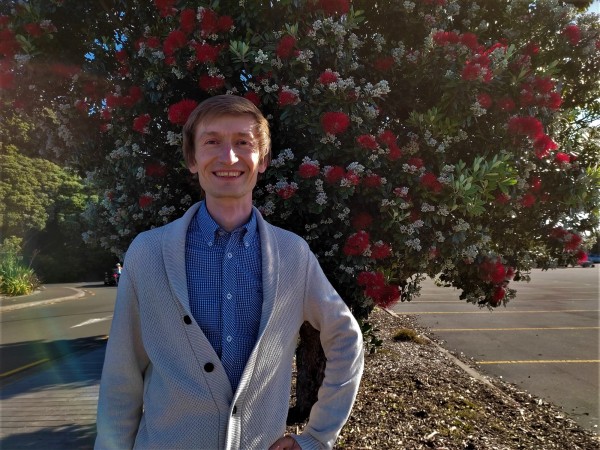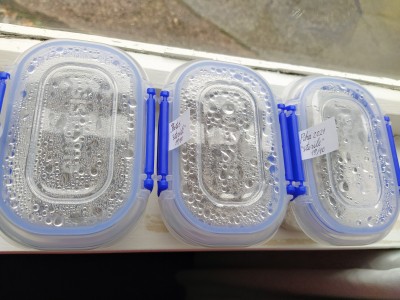Vladislav Kholostiakov, plant whisperer

Vladislav Kholostiakov checking out a local pohutukawa
How did you come to study the natural world?
As a kid, I collected insects and snails, trying to keep them alive at home and observing their behaviour. When I was about 3 years old, I asked my parents the name of a person who studies the natural world. Having the answer "biologist", I convinced them that I would be a biologist when I grew up.
My mother bought me every available book related to biological knowledge, and I was a frequent visitor in public libraries. I was lucky to grow up and be educated in Saint-Petersburg, the "Cultural Capital of Russia”. I was also lucky to spend summer holidays in the Carpathian mountains, where my grandparents lived self-sufficiently, having a big garden, pigs, and chickens. At the age of 9, I began to grow plants at home in Saint-Petersburg. Two years later, I added two aquariums with tropical fish. After that were five species of stick-insects, two giant spiders from Brazil, a rat, and hamsters.
The decision to become a parasitologist or immunologist came later. My mother worked at a hospital, and she dreamed of seeing me as a doctor. I did not want to become a doctor, but the idea of working with diseases was appealing; therefore, I made a decision to choose parasitology for my Bachelor’s and shifted to immunology for my Masters at Saint Petersburg State University.
What motivates you to study a plant microbiome?
Terrestrial life has evolved as a consortium of different species, and many of them cannot survive without each other. People have changed the balance, moving plants and animals worldwide, introducing novel pathogens to the naive hosts. However, people may also be key to establishing a new equilibrium of host-pathogen interactions. We can use pathogenic and beneficial microorganisms instead of herbicides, insecticides, and other harmful chemicals. I am looking at the plant microbiome as a tool for better forestry and agriculture. However, firstly we need to know how different fungi, bacteria or protozoa influence each other within the plants and how environmental conditions may change these interactions. Currently, we know almost nothing about it.
What are you enjoying most about your PhD so far?
Because I haven’t been able to get into the lab due to lockdown in Auckland, I have been growing my pōhutukawa seedlings at home and enjoying the process. My home lab is a set of plastic Sistema containers housing recently germinated seedlings on two types of sterile substrates. I’ll be identifying which microbial species have survived within seeds and germinated inside the seedlings within these sterile environments.
When I get back to the lab, I look forward to growing seedlings on traditional, native soils sourced from regional parks and other areas. By comparing the set of microbes from the seedlings grown in sterile environments with those grown in traditional soil, I’ll be able to determine which microbial communities are transmitted vertically from the adult plant and which are transmitted horizontally from the environment.
The research itself is exciting and enjoyable, but I also just love to work with seedlings, from when they germinate, to when they develop their first leaves, and become "teenagers". In the past, I have raised from seed more than 200 species from wild populations. Many of these plants continue their life in the Saint Petersburg Botanical Garden and private collections. I am happy to continue this work here in Aotearoa New Zealand.

Vlad's home laboratory set-up
The Beyond Myrtle Rust programme would like to thank Emma Bodley from the Auckland Botanic Gardens for kindly providing the pōhutukawa seeds that enabled Vlad to get underway with his project. Vlad is studying under the supervision of Mahajabeen Padamsee and Bruce Burns (Auckland University) and Hayley Ridgway (Plant & Food Research.) For more information about his work, contact Renee Johansen (Beyond Myrtle Rust, johansenr@landcareresearch.co.nz)
